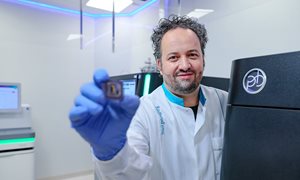
Geneticist Alexander Hoischen of Radboud university medical center receives an NWO Vici grant, one of the largest individual scientific awards in the Netherlands. With this funding, he initiates a new research line into novel genetic disorders where the immune system is impaired. Within this project, he aims to analyze available genetic data on a large scale in a novel manner. Additionally, he will employ the most innovative technologies to generate new DNA and RNA data. This initiative seeks to identify and understand more genetic causes of immune disorders.
Genetic disorders where the immune system is impaired (Inborn Errors of immunity: IEIs) lead to frequent infections, but if there is overactivity this also causes damage to the body. For IEIs up to 80% are actionable once the genetic basis is known. Currently, the discovery rate for genetic causes of IEIs is lagging behind compared to other rare diseases. SOLVE-IEI has the ambition to identify new causes of IEIs by applying very innovative genetics research. This consists ofsmart re-analysis of existing data, by applying latest genomic technologies, such as ‘long-read DNA sequencing’ and ‘optical genome mapping’, and by functionally testing the immune cells from blood of patients.
Severe course of COVID-19
Alexander Hoischen is a researcher at the Departments of Genetics and Internal Medicine at Radboudumc. He graduated summa cum laude in Bonn and then joined Radboudumc in 2007, where he introduced new forms of DNA analysis: exome and genome sequencing. These methods enable more patients to receive a diagnosis and determine the cause of their rare condition. In 2020, he identified a rare immune disorder that could lead to a severe course of COVID-19 among young, healthy men. With this new research line, Hoischen expects to identify more genetic causes of rare immune disorders.
Rare Disease Day 2024
February 29th is Rare Disease Day. It's a day dedicated to bringing extra attention to patients with rare diseases, such as these immune disorders. Rare diseases are often caused by genetic defects. The identification of the genetic disease cause, and as such the correct diagnosis, is of great importance for individualized patientcare. Hoischen says: ‘The more we know about a rare genetic condition, the faster we can provide clarity. That’s why I’m honored and thrilled to receive this prestigious grant. I am thrilled to work on the interphase of two disciplines human genetics and human immunology; and have the privilege to do so at two top departments of the Radboudumc. This project will allow us to continue to build a team and expertise. This will allow us to push genetic innovations for inborn errors of immunity and help more patients with rare immune diseases in the future.’
Vici grants
Vici is one of the largest scientific grants for individuals in the Netherlands and targets advanced researchers. The funding instrument enables researchers to pursue research of their own choice. This gives innovative research a boost and encourages the promotion of talent at scientific research institutes. Vici grants are awarded annually by the Dutch scientific organization NWO. This year, 35 Vici grants were awarded. In addition to the grant for Hoischen, three other researchers from Nijmegen are receiving Vici grants: Mark Dingemanse, Floris de Lange and Marius Peelen of Radboud University.
-
Want to know more about these subjects? Click on the buttons below for more news.
More information
Pauline Dekhuijzen

wetenschaps- en persvoorlichter





